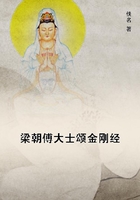"O father! and can thought conceive That happy souls this realm would leave, And seek the upper sky, With sluggish clay to reunite? This direful longing for the light, Whence comes it, say, and why? "(7)This direful longing, then, does it still exist even in that boasted purity of the disembodied spirits, and does it still proceed from the death-infected members and earthly limbs? Does he not assert that, when they begin to long to return to the body, they have already been delivered from all these so-called pestilences of the body? From which we gather that, were this endlessly alternating purification and defilement of departing and returning souls as true as it is most certainly false, yet it could not be averred that all culpable and vicious motions of the soul originate in the earthly body; for, on their own showing, "this direful longing," to use the words of their noble exponent, is so extraneous to the body, that it moves the soul that is purged of all bodily taint, and is existing apart from any body whatever, and moves it, moreover, to be embodied again.So that even they themselves acknowledge that the soul is not only moved to desire, fear, joy, sorrow, by the, flesh, but that it can also be agitated with these emotions at its own instance.
CHAP.6.--OF THE CHARACTER OF THE HUMAN WILL WHICH MAKES THE AFFECTIONSOF THE
SOUL RIGHT OR WRONG.
But the character of the human will is of moment; because, if it is wrong, these motions of the soul will be wrong, but if it is right, they will be not merely blameless, but even praiseworthy.For the will is in them all; yea, none of them is anything else than will.For what are desire and joy but a volition of consent to the things we wish? And what are fear and sadness but a volition of aversion from the things which we do not wish? But when consent takes the form of seeking to possess the things we wish, this is called desire; and when consent takes the form of enjoying the things we wish, this is called joy.In like manner, when we turn with aversion from that which we do not wish to happen, this volition is termed fear; and when we turn away from that which has happened against our will, this act of will is called sorrow.
And generally in respect of all that we seek or shun, as a man's will is attracted or repelled, so it is changed and turned into these different affections.Wherefore the man who lives according to God, and not according to man, ought to be a lover of good, and therefore a hater of evil.And since no one is evil by nature, but whoever is evil is evil by vice, he who lives according to God ought to cherish towards evil men a perfect hatred, so that he shall neither hate the man because of his vice, nor love the vice because of the man, but hate the vice and love the man.For the vice being cursed, all that ought to be loved, and nothing that ought to be hated, will remain.
CHAP.7.--THAT THE WORDS LOVE AND REGARD (AMOR AND DILECTIO) ARE INSCRIPTURE USED
INDIFFERENTLY OF GOOD AND EVIL AFFECTION.
He who resolves to love God, and to love his neighbor as himself, not according to man but according to God, is on account of this love said to be of a good will; and this is in Scripture more commonly called charity, but it is also, even in the same books, called love.For the apostle says that the man to be elected as a ruler of the people must be a lover of good.(1) And when the Lord Himself had asked Peter, "Hast thou a regard for me (diligis)more than these?" Peter replied, "Lord, Thou knowest that Ilove (amo) Thee." And again a second time the Lord asked not whether Peter loved (amaret) Him, but whether he had a regard (diligeret)for Him, and, he again answered, "Lord, Thou knowest that I love (amo) Thee." But on the third interrogation the Lord Himself no longer says, "Hast thou a regard (diligis) for me," but "Lovest thou (amas) me?" And then the evangelist adds, "Peter was grieved because He said unto him the third time, Lovest thou (amas) me?" though the Lord had not said three times but only once, "Lovest thou (amas) me?" and twice "Diligis me?"from which we gather that, even when the Lord said "diligis," He used an equivalent for "amas." Peter, too, throughout used one word for the one thing, and the third time also replied, "Lord, Thou knowest all things, Thou knowest that I love (amo)Thee."(2)















